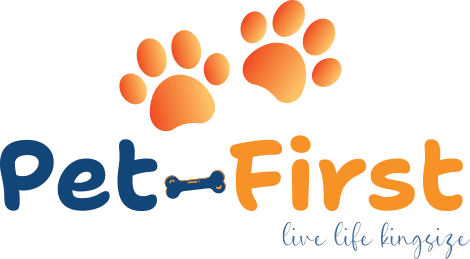Best Pet Hospital Kokapet for Dogs & Cats | Book an Appointment
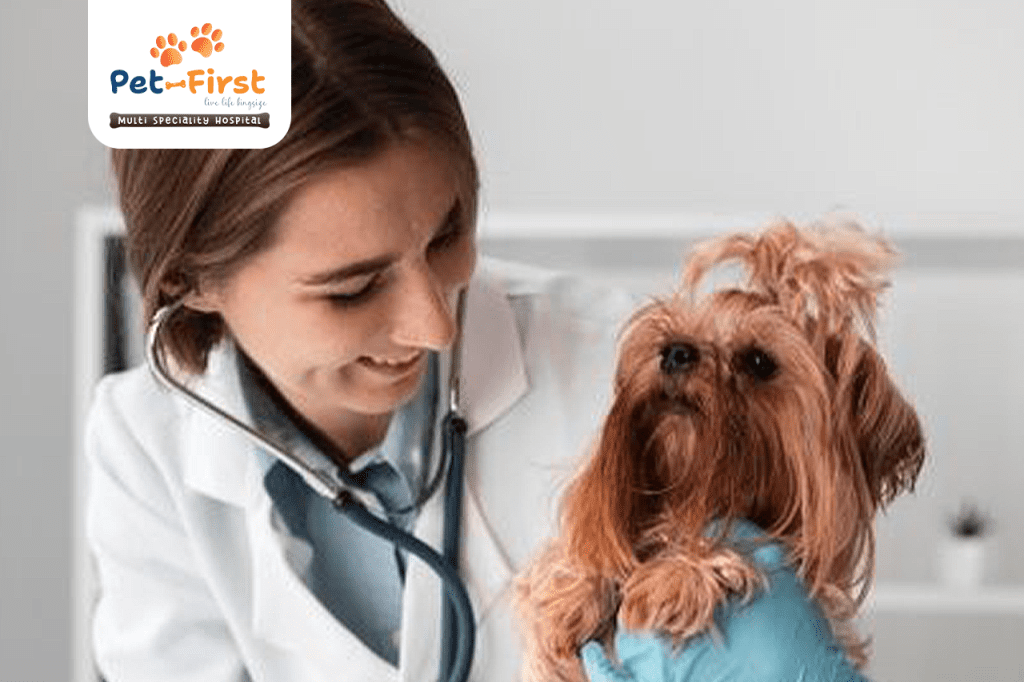
Best Pet Hospital Kokapet for Dogs & Cats | Book an Appointment Pets are not just animals; they are family. Whether it’s a playful puppy, a loyal adult dog, or a calm and curious cat, every pet deserves the best medical care possible. As pet ownership continues to grow in Hyderabad, especially in premium residential areas like Kokapet, the demand for professional and compassionate veterinary care has also increased. Finding the Best Pet Hospital Kokapet for Dogs & Cats is essential for ensuring your pet’s long-term health, happiness, and safety. This blog will help you understand why choosing the right pet hospital matters, what services you should expect, and how expert veterinary care can make a real difference in your pet’s life. Why Choosing the Right Pet Hospital Matters Pets cannot speak when they are in pain or discomfort. They rely entirely on their owners to recognize symptoms and seek timely medical help. A well-equipped pet hospital plays a critical role in early diagnosis, preventive care, emergency treatment, and overall wellness. The Best Pet Hospital Kokapet for Dogs & Cats focuses not just on treating illnesses but also on preventing them. From regular vaccinations to advanced diagnostic services, the right hospital ensures that your pet receives comprehensive care at every stage of life. Growing Need for Pet hospital in Kokapet Kokapet has rapidly evolved into a prominent residential and lifestyle hub in Hyderabad. With modern apartments, gated communities, and villas, more families are welcoming pets into their homes. This growth has created a strong need for reliable veterinary services close to home. Pet parents today are more informed and concerned about quality healthcare. They actively search for the Best Pet Hospital Kokapet for Dogs & Cats that offers modern infrastructure, experienced veterinarians, and a caring environment. Comprehensive Services Offered by the Best Pet Hospital Kokapet for Dogs & Cats A top-quality pet hospital provides a wide range of services under one roof. This not only saves time but also ensures continuity of care. 1. Preventive Healthcare and Vaccination( Pet hospital Kokapet) Vaccination is the foundation of a healthy life for dogs and cats. Puppies and kittens require timely immunization to protect them from life-threatening diseases. At the Best Pet Hospital Kokapet for Dogs & Cats, vaccination schedules are carefully designed based on your pet’s age, breed, and lifestyle. Regular deworming and parasite control are also included as part of preventive care. 2. Routine Health Checkups Regular health checkups help detect issues early before they become serious. Annual or bi-annual wellness exams are highly recommended for all pets. The Best Pet Hospital Kokapet for Dogs & Cats conducts thorough physical examinations, weight checks, dental assessments, and nutritional evaluations to keep your pet in optimal health. 3. Advanced Diagnostic Facilities Accurate diagnosis is the key to effective treatment. A reliable pet hospital is equipped with modern diagnostic tools such as: Digital X-rays Ultrasound imaging Blood tests Urine and stool analysis These facilities allow veterinarians to diagnose problems quickly and begin treatment without delay. The Best Pet Hospital Kokapet for Dogs & Cats ensures precision and transparency in diagnostics. 4. Emergency and Critical Care Medical emergencies can occur at any time, including accidents, poisoning, breathing difficulties, or sudden illness. Immediate professional attention can save a pet’s life. The Best Pet Hospital Kokapet for Dogs & Cats is prepared to handle emergencies with trained staff, emergency equipment, and prompt decision-making. Having access to reliable emergency care offers peace of mind to every pet parent. 5. Surgical Services Sometimes surgery is unavoidable, whether it’s a routine procedure like spaying or neutering, or a more complex operation. A trusted hospital follows strict safety protocols, uses advanced anesthesia monitoring, and provides post-operative care to ensure a smooth recovery. The Best Pet Hospital Kokapet for Dogs & Cats prioritizes safety, hygiene, and comfort during every surgical procedure. 6. Dental Care for Pets Most of the time Dental care is often overlooked, but it plays a major role in overall well-being. Dental issues can lead to pain, infections, and even organ damage if untreated. The Best Pet Hospital Kokapet for Dogs & Cats offers dental checkups, cleaning, and treatment to keep your pet’s teeth and gums healthy. 7. Nutrition and Diet Counseling Every pet has unique nutritional needs based on age, breed, activity level, and medical conditions. Improper diet can lead to obesity, allergies, and digestive issues. At the Best Pet Hospital Kokapet for Dogs & Cats, veterinarians guide pet parents with personalized diet plans, feeding schedules, and nutritional supplements if required. Special Care for Dogs Dogs require consistent healthcare, behavioral guidance, and preventive care. From energetic puppies to senior dogs, their needs change over time. The Best Pet Hospital Kokapet for Dogs & Cats provides: Puppy wellness programs Senior dog care Skin and coat treatment Joint and mobility support Behavioral consultation This holistic approach ensures dogs stay active, comfortable, and happy throughout their lives. Specialized Care for Cats Cats are sensitive animals and often hide signs of illness. They require gentle handling and a calm environment. The Best Pet Hospital Kokapet for Dogs & Cats understands feline behavior and offers stress-free examinations, cat-specific vaccinations, and treatment plans tailored exclusively for cats. Experienced Veterinarians You Can Trust The quality of a pet hospital is defined by its veterinary team. Experienced vets not only treat illnesses but also educate pet parents. The Best Pet Hospital Kokapet for Dogs & Cats is backed by skilled veterinarians who stay updated with the latest medical advancements and follow ethical treatment practices. Their compassionate approach helps build trust and long-term relationships with pet families. Clean, Safe, and Pet-Friendly Environment A clean and hygienic hospital environment is crucial for infection control and recovery. Proper sanitation, separate waiting areas, and comfortable recovery spaces make a big difference. The Best Pet Hospital Kokapet for Dogs & Cats maintains high standards of cleanliness and ensures a calm, pet-friendly atmosphere to reduce anxiety for both pets and owners. Why Pet Parents Choose the Best Pet Hospital Kokapet for
Pet Boarding in Hyderabad | Complete Guide
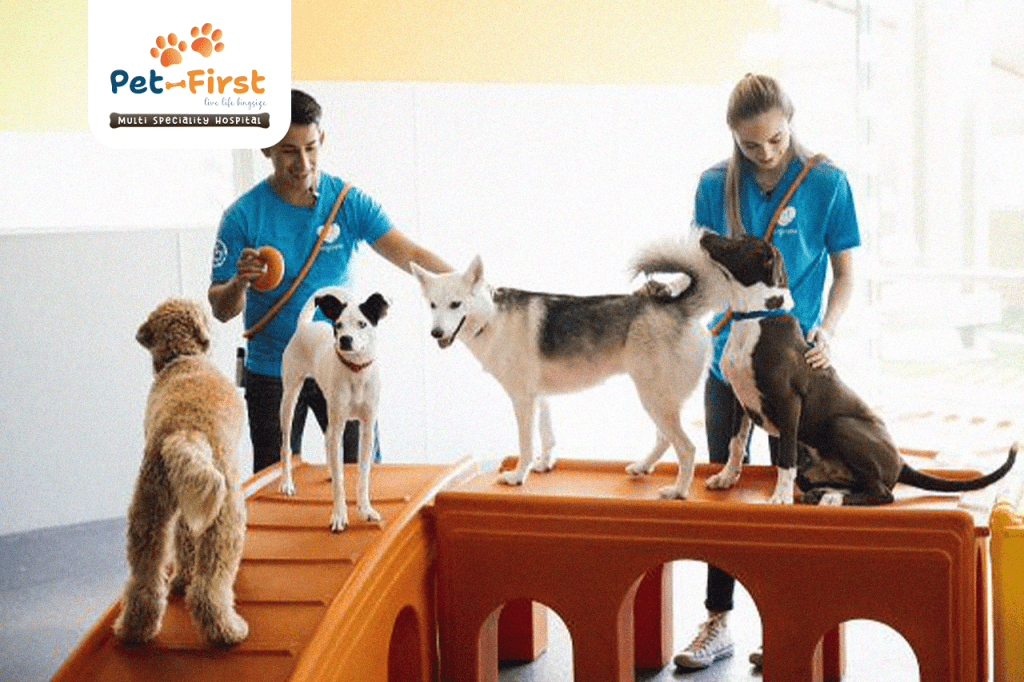
Pet Boarding in Hyderabad – Complete Guide Leaving your pet behind for the first time can feel overwhelming. Whether you are traveling for work, vacation, or a family emergency, ensuring your furry companion is safe and comfortable becomes your top priority. For new pet parents, understanding how pet boarding in Hyderabad works can make the entire process less stressful and more reassuring. This guide walks you through everything you need to know — from choosing the right facility to preparing your pet emotionally and physically. What Is Pet Boarding? Pet boarding is a professional service where trained caregivers look after your pet while you are away. These facilities provide food, shelter, supervision, exercise, and sometimes medical care. Unlike leaving pets with neighbors or friends, boarding centers are designed specifically to meet animal needs. In a growing metro like Hyderabad, the demand for safe and hygienic boarding services has increased as more families consider pets as family members. Why First-Time Pet Parents Feel Anxious – pet boarding in Hyderabad If this is your first time using a boarding facility, your worries are completely natural. Questions like these are common: Will my pet feel scared or lonely? Will they eat properly? What if they fall sick? Will caregivers understand their behavior? The good news is that modern pet care centers in Hyderabad are designed to reduce stress for animals and provide round-the-clock supervision. Types of Pet Boarding Facilities Not all boarding options are the same. Understanding the types available helps you choose what suits your pet best. 1. Standard Kennels These are basic but functional facilities that provide individual enclosures, feeding schedules, and regular walks. 2. Premium Pet Resorts These offer spacious rooms, play areas, grooming services, and sometimes webcams for pet parents to check in remotely. 3. Veterinary-Linked Boarding – pet boarding in Hyderabad Some hospitals offer boarding attached to a clinic, which is ideal for pets with medical needs. Immediate vet access is a big advantage. 4. Home-Style Boarding – pet boarding in Hyderabad This option places pets in a home environment with fewer animals, suitable for pets who get anxious in large facilities. When exploring pet boarding services in Hyderabad, choose based on your pet’s personality, age, and health condition. How to Choose the Right Boarding Facility Making the right choice requires more than a quick Google search. Here’s what to check: Cleanliness and Hygiene The facility should be odor-free, well-ventilated, and cleaned regularly. Hygiene reduces the risk of infections. Trained Staff Caregivers should understand animal behavior, feeding routines, and emergency handling. Veterinary Support Access to a veterinarian is crucial, especially for senior pets or those with medical histories. Space and Comfort Pets need enough room to move, rest, and play. Overcrowded spaces can increase stress. Exercise and Playtime Daily walks and supervised play sessions are essential for both physical and mental health. Visiting the location personally before booking helps you assess whether the environment feels safe and welcoming. Preparing Your Pet for Boarding A smooth boarding experience starts before you even leave home. Schedule a Trial Stay A short overnight stay helps your pet get familiar with the place and reduces separation anxiety later. Maintain Routine Try to keep feeding and walking times consistent before boarding so the transition feels easier. Pack Familiar Items Carry your pet’s favorite blanket, toy, or bed. Familiar scents offer comfort in a new environment. Share Medical Information Provide vaccination records, medication details, and any special dietary requirements. Preparation plays a huge role in making pet stays in Hyderabad comfortable for first-time boarders. Vaccinations and Health Requirements Most professional boarding facilities require pets to be vaccinated. Common requirements include: Rabies vaccine Distemper/parvo combination (for dogs) Feline vaccinations (for cats) Tick and flea prevention These measures protect not just your pet but others staying at the facility. Some centers may also ask for recent health check-up reports. Managing Separation Anxiety Pets can miss their owners just as much as owners miss them. Signs of stress may include loss of appetite, excessive barking, or withdrawal. To reduce anxiety: Avoid emotional goodbyes; keep departures calm Inform staff about your pet’s behavior patterns Choose facilities that allow interaction and playtime Experienced caregivers in Hyderabad pet boarding centers are trained to comfort anxious pets and keep them engaged. Daily Routine at a Boarding Facility Knowing how your pet’s day will look can ease your mind. Morning: Feeding, cleaning, and short walksMidday: Playtime or social interactionEvening: Dinner and relaxationNight: Supervised rest in secure enclosures Premium facilities may include grooming, training sessions, and enrichment activities to keep pets mentally stimulated. Food and Special Diets If your pet follows a specific diet, always provide their regular food. Sudden changes can upset digestion. Label meal portions clearly and mention feeding times. Many boarding homes for pets in Hyderabad accommodate customized meal plans and medication schedules. Safety Measures to Look For Safety should be non-negotiable. Check for: Secure fencing and gates 24/7 supervision Emergency protocols Separate areas for aggressive or sick animals These precautions ensure pets remain protected throughout their stay. Communication While You’re Away Modern pet parents want updates, and many facilities now provide: Daily photos or videos WhatsApp updates Video calls on request Regular communication helps reduce your anxiety and reassures you that your pet is doing well. Costs of Pet Boarding Prices vary depending on the type of facility, room size, and additional services. Premium options with air-conditioned rooms and personal care cost more than standard kennels. While affordability matters, never compromise on hygiene, supervision, and medical support when selecting boarding for pets in Hyderabad. Boarding for Different Types of Pets Puppies and Kittens Young pets need more attention, vaccinations, and gentle handling. Senior Pets Older animals may require medication, orthopedic bedding, and closer monitoring. Special Needs Pets Facilities linked with veterinary care are better equipped for pets with health conditions. Discuss your pet’s age and requirements in detail before confirming the stay. After You Bring Your Pet Home Once reunited, your pet may act extra excited or slightly
Why Pets First Hospital 24/7 Is Every Pet Parent Needs
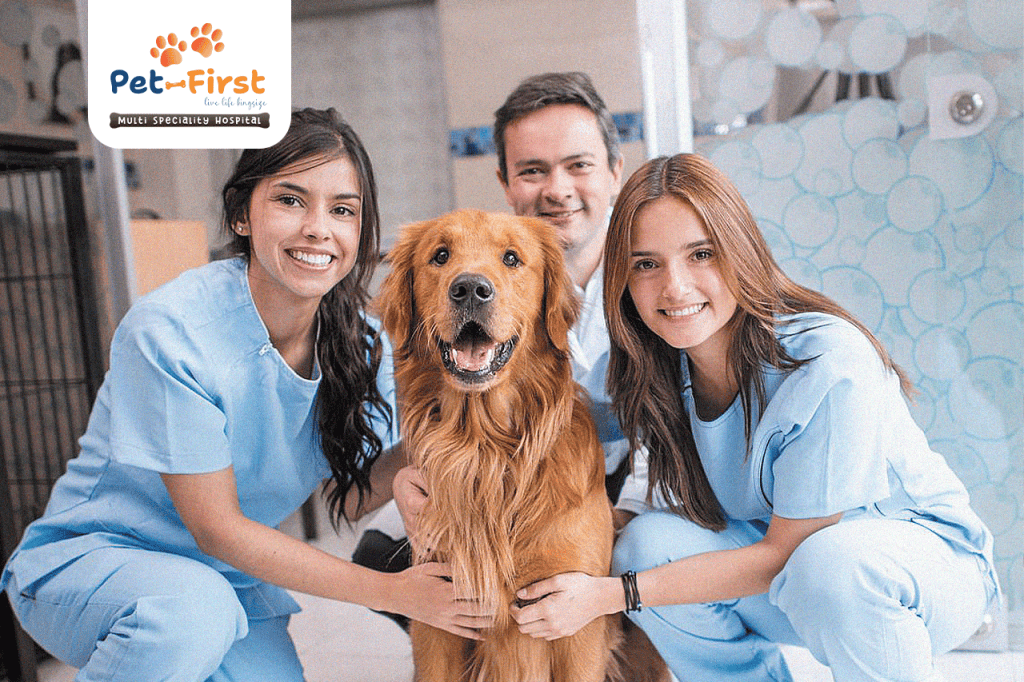
Why Pets First Hospital 24/7 Is the Lifesaver Every Pet Parent Needs Pet emergencies rarely come with a warning. One moment your dog is happily playing, and the next they may be limping, vomiting, or showing signs of distress. In such critical situations, having access to immediate veterinary care can make the difference between life and loss. That’s where Pets First Hospital 24/7 becomes an essential support system for pet parents who want nothing but the best for their furry family members. The Reality of Pet Emergencies – Pets First Hospital 24/7 Just like humans, pets can face sudden health crises. From road accidents and poisoning to breathing issues and seizures, emergencies can occur at any time — late at night, during holidays, or early in the morning when most clinics are closed. Many pet owners panic because they don’t know where to turn during off-hours. This is exactly why Pets First Hospital 24/7 plays such a crucial role in urban pet healthcare. Round-the-clock veterinary access ensures that pets receive timely medical attention without dangerous delays. Early treatment often prevents complications and significantly improves survival rates. Why 24/7 Veterinary Care Matters – Pets First Hospital 24/7 Delaying treatment during an emergency can worsen a pet’s condition rapidly. Conditions like bloat, internal bleeding, or heatstroke can become fatal within hours. A fully equipped facility such as Pets First Hospital provides immediate triage, stabilization, and advanced care when time is critical. Continuous availability also brings peace of mind. Pet parents can rest easier knowing professional help is always just a call away, no matter the hour. Advanced Emergency Infrastructure – Pets First Hospital 24/7 Not every veterinary clinic is prepared to handle high-risk emergencies. Intensive care requires specialized equipment, trained staff, and monitoring systems. Pets First Hospital is designed with emergency readiness in mind, offering: Oxygen support and ventilators ICU monitoring systems Emergency surgery facilities In-house diagnostic labs 24-hour pharmacy access This level of infrastructure allows veterinarians to act quickly and accurately, which is vital in life-threatening situations. Experienced Emergency Veterinarians Emergency care requires a different skill set compared to routine consultations. Rapid assessment, quick decision-making, and crisis management are key. The medical team at Pets First Hospital 24/7 is trained to handle trauma cases, poisoning incidents, cardiac distress, and other urgent conditions with precision and calmness. Their expertise ensures that pets receive not just fast care, but the right care at the right time. Critical Care and ICU Support Some emergencies don’t end after initial treatment. Pets recovering from major surgery, severe infections, or organ failure may need constant monitoring. Pets First Hospital 24/7 provides dedicated ICU care where vital signs are observed continuously. This level of supervision helps detect complications early and improves recovery outcomes. For pet parents, knowing their companion is under expert watch brings immense relief during stressful times. Rapid Diagnostic Services In emergencies, waiting for lab results from external centers can waste precious time. Pets First Hospital 24/7 offers in-house diagnostics including blood tests, X-rays, ultrasound, and other imaging services. Quick diagnosis leads to faster treatment decisions. Whether it’s identifying internal injuries or detecting toxin exposure, rapid testing saves lives. Emergency Surgeries Without Delay Accidents and critical illnesses sometimes require immediate surgical intervention. A delay of even a few hours can be dangerous. Pets First Hospital 24/7 is equipped to perform emergency procedures such as wound repair, foreign object removal, and life-saving abdominal surgeries. Having surgical facilities available at all hours ensures pets don’t have to be referred elsewhere during critical moments. Support Beyond Emergencies While emergency care is vital, prevention and follow-up treatment are equally important. Pets First Hospital also focuses on post-emergency rehabilitation, medication management, and recovery monitoring. This continuity of care helps pets heal faster and reduces the chances of relapse or complications after discharge. A Stress-Free Environment for Pets Hospitals can be overwhelming for animals, especially during emergencies. The team at Pets First Hospital 24/7 understands the emotional needs of pets and works to maintain a calm, controlled environment. Gentle handling, pain management protocols, and stress-reduction techniques are used to keep pets as comfortable as possible during treatment. Guidance for Pet Parents Emergencies are emotionally draining for owners too. Clear communication makes a big difference. Veterinarians at Pets First Hospital ensure that pet parents are informed about diagnosis, treatment options, risks, and expected recovery. Transparent discussions help families make confident, informed decisions during critical moments. Handling Night-Time and Holiday Crises One of the biggest advantages of Pets First Hospital 24/7 is availability during late-night hours and public holidays. Many serious pet emergencies happen outside regular clinic timings, leaving owners helpless. Round-the-clock service eliminates this gap in care, ensuring that no pet suffers due to lack of access. Specialized Care for Different Pets Dogs and cats have different medical needs, and emergency care must be tailored accordingly. Pets First Hospital 24/7 is experienced in handling a wide range of species-specific emergencies, from feline urinary blockages to canine trauma injuries. This specialized approach ensures accurate and effective treatment for every patient. Preventing Future Emergencies After stabilizing a pet, veterinarians often guide owners on preventing future health risks. Pets First Hospital 24/7 emphasizes education on topics like toxin avoidance, safe exercise, proper nutrition, and early symptom recognition. Preventive awareness reduces repeat emergencies and helps pets live longer, healthier lives. Trust Built Through Reliability Trust is earned when help arrives exactly when it’s needed most. Over time, pet parents come to rely on Pets First Hospital 24/7 not just for emergencies, but as a dependable healthcare partner. Knowing there is a dedicated facility prepared for any crisis builds long-term confidence and loyalty. Technology That Supports Faster Recovery Modern veterinary medicine relies on technology for better outcomes. From digital imaging to advanced monitoring systems, Pets First Hospital 24/7 uses updated medical tools to improve diagnostic accuracy and treatment efficiency. Technology combined with expertise leads to faster stabilisation and smoother recovery journeys. Emotional Relief for Families Seeing a beloved pet in distress can be heartbreaking. Having immediate access
Common Diseases in Dogs and How to Prevent Them
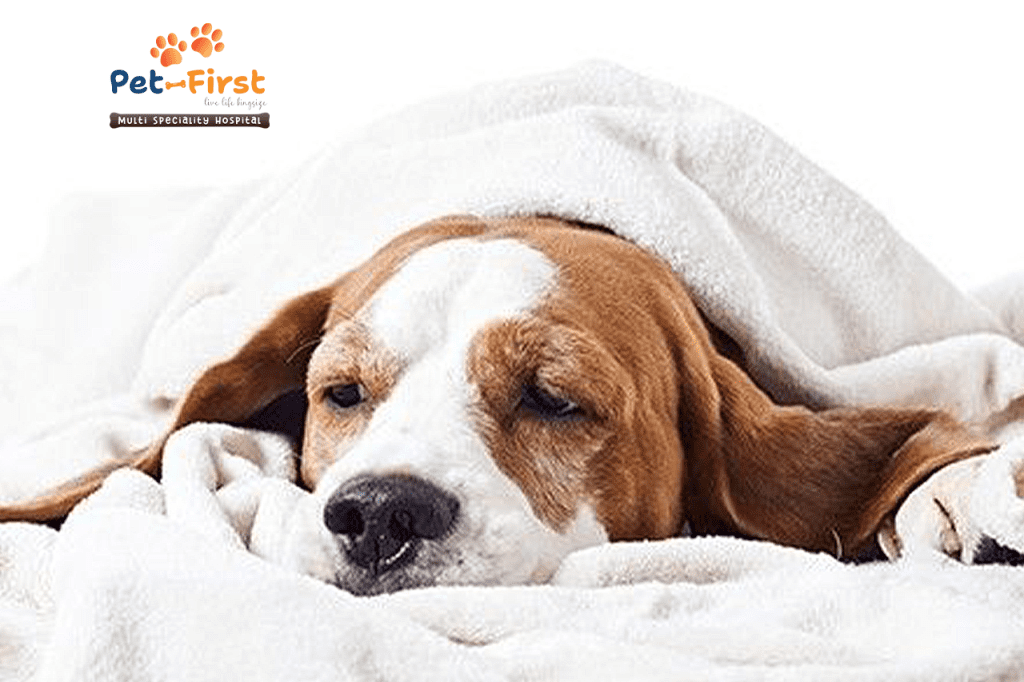
Common Diseases in Dogs and How to Prevent Them Dogs are loving, loyal companions, and as pet parents, keeping them healthy is a top priority. Understanding common diseases in dogs and how to prevent them can help you detect early warning signs and ensure your furry friend lives a long, happy life. Many dog health problems can be avoided with proper vaccination, hygiene, nutrition, and regular veterinary care. In this guide, we’ll cover the most common dog diseases, their symptoms, and practical steps for dog disease prevention. Why Knowing Common Dog Diseases Matters Dogs cannot tell us when they feel unwell, so it’s important for pet parents to recognize subtle signs of illness. Early detection of common diseases in dogs can prevent complications and reduce treatment costs. Preventive care is always better than emergency treatment. Regular vet checkups, timely vaccinations, and awareness about dog health problems are essential parts of responsible pet parenting. 1. Parvovirus (Parvo) – Common Diseases in Dogs Parvovirus is one of the most serious and common diseases in dogs, especially puppies. It spreads through contaminated food, surfaces, or contact with infected dogs. Symptoms: Severe vomiting Bloody diarrhea Loss of appetite Extreme weakness Prevention: Follow the complete dog vaccination schedule Avoid taking unvaccinated puppies to public places Maintain proper hygiene at home Parvo can be fatal, but it is preventable through timely preventive care for dogs. 2. Canine Distemper – Common Diseases in Dogs Canine distemper is a viral infection affecting a dog’s respiratory, digestive, and nervous systems. It is highly contagious and considered a major dog health risk. Symptoms: Fever Nasal discharge Coughing Seizures in severe cases Prevention: Core vaccinations for dogs Avoid contact with stray or unvaccinated dogs Vaccination is the most effective method of dog disease prevention against distemper. 3. Rabies – Common Diseases in Dogs Rabies is a deadly viral disease that affects the brain and nervous system. It can spread to humans through bites, making it a serious public health concern. Symptoms: Aggressive behavior Excessive drooling Paralysis Behavioral changes Prevention: Mandatory rabies vaccination for dogs Keep your dog away from wild animals Report stray dog bites immediately Rabies is preventable but almost always fatal once symptoms appear. 4. Tick Fever (Ehrlichiosis & Babesiosis) Tick-borne illnesses are common diseases in dogs, especially in warm climates. Ticks transmit harmful parasites that attack the blood. Symptoms: Fever Loss of appetite Nosebleeds Lethargy Prevention: Regular tick and flea treatments Grooming and checking your dog’s coat Keeping living areas clean Using vet-approved parasite control is key to preventing dog diseases caused by ticks. 5. Kennel Cough Common Diseases in Dogs Kennel cough is a contagious respiratory infection seen in dogs that spend time in boarding facilities or parks. Symptoms: Persistent dry cough Sneezing Mild fever Nasal discharge Prevention: Vaccination for kennel cough Avoid crowded dog areas during outbreaks Maintain strong immunity with proper nutrition Though often mild, untreated kennel cough can develop into pneumonia. 6. Skin Infections – Common Diseases in Dogs Skin issues are among the most common dog health problems. Allergies, fungal infections, and parasites can cause irritation. Symptoms: Itching and scratching Hair loss Red or inflamed skin Bad odor from the skin Prevention for Common Diseases in Dogs: Regular bathing with dog-friendly shampoo Balanced diet for healthy skin Prompt treatment of fleas and ticks Good hygiene plays a big role in dog disease prevention related to skin conditions. 7. Ear Infections – (Common Diseases in Dogs) Dogs with floppy ears or excessive hair in their ears are more prone to infections. Symptoms: Head shaking Ear scratching Bad smell from ears Redness or discharge Prevention: Clean ears regularly with vet-recommended solutions Keep ears dry after bathing Regular veterinary checkups Ignoring ear infections can lead to pain and hearing problems. 8. Dental Disease – Common Diseases in Dogs Dental issues are often overlooked but are very common diseases in dogs. Plaque buildup can lead to gum infections and tooth loss. Symptoms: Bad breath Difficulty eating Swollen gums Loose teeth Prevention: Brush your dog’s teeth regularly Provide dental chews Professional dental cleaning when needed Oral health is a vital part of preventive care for dogs. 9. Obesity – Common Diseases in Dogs Obesity is an increasing problem among pet dogs and can lead to diabetes, joint issues, and heart disease. Symptoms: Weight gain Low energy Difficulty moving Prevention: Balanced diet recommended by a veterinarian Regular exercise and playtime Avoid overfeeding treats Maintaining a healthy weight reduces the risk of many common dog diseases. 10. Worm Infestations – Common Diseases in Dogs Intestinal worms are common in puppies and adult dogs, especially those that spend time outdoors. Symptoms: Pot-bellied appearance Diarrhea Weight loss Worms visible in stool Prevention: Regular deworming schedule Clean surroundings Avoid contaminated food and water Routine deworming is an essential step in dog disease prevention. General Tips to Prevent Common Diseases in Dogs Preventing common diseases in dogs requires a proactive approach: 🐶 Vaccinations Follow your veterinarian’s recommended dog vaccination schedule to protect against life-threatening illnesses. 🥗 Proper Nutrition A balanced diet strengthens immunity and supports overall dog health. 🧼 Hygiene Regular grooming, bathing, and cleaning of bedding reduce infection risks. 🏃 Exercise Daily activity keeps your dog physically and mentally healthy. 🩺 Routine Vet Visits Annual or biannual checkups help detect dog health problems early. 🐾 Parasite Control Use preventive treatments for fleas, ticks, and worms. When to Visit a Vet Immediately Even with preventive care, some symptoms require urgent attention: Continuous vomiting or diarrhea Seizures Difficulty breathing Severe injuries Sudden behavioral changes Early veterinary care can save your dog’s life. Final Thoughts Understanding common diseases in dogs and how to prevent them empowers pet parents to take better care of their furry companions. Prevention through vaccination, hygiene, nutrition, and routine vet visits is always more effective than treatment after illness strikes. A healthy dog is a happy dog — and with proper preventive care for dogs, you can
Online Vet Consultation in Hyderabad | 24/7 Pet First
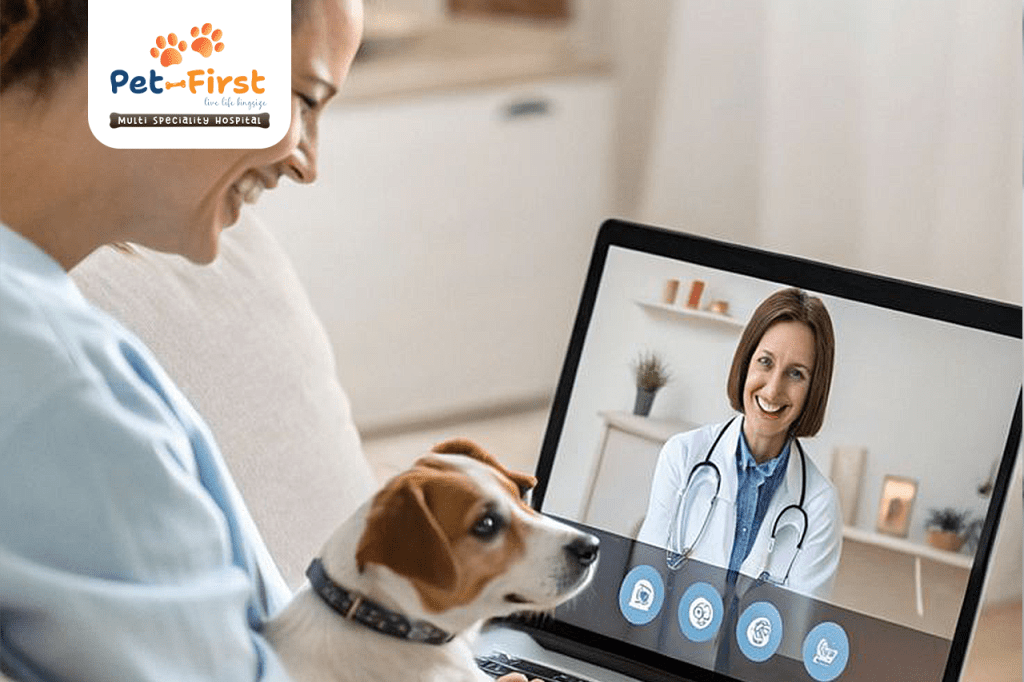
Online Vet Consultation in Hyderabad: 24/7 Expert Pet Care from Pet First Pet parents in Hyderabad know how stressful it can be when a pet falls sick unexpectedly—especially late at night or during emergencies. From sudden vomiting to injuries, skin allergies, or behavioral changes, timely veterinary advice can make a life-saving difference. This is where online vet consultation in Hyderabad plays a crucial role. At Pet First, a 24/7 multispecialty pet hospital in Hyderabad, we offer trusted, professional, and compassionate online vet consultation services that connect you instantly with experienced veterinarians—anytime, anywhere. What Is Online Vet Consultation? Online vet consultation is a digital veterinary service that allows pet owners to consult qualified vets through video calls, voice calls, or chat. Instead of waiting for clinic hours or traveling across the city, pet parents can receive expert veterinary guidance from the comfort of their home. For busy urban pet parents in Hyderabad, online veterinary consultation ensures quick access to professional advice without compromising on quality care. Why Online Vet Consultation Is Essential for Hyderabad Pet Parents Hyderabad is a fast-growing city with pet parents spread across areas like Hitech City, Gachibowli, Kukatpally, Jubilee Hills, Banjara Hills, and Secunderabad. Traffic, long distances, and time constraints can delay timely treatment. With Pet First Hyderabad, online vet consultation bridges this gap by offering: 24/7 access to certified veterinarians Immediate guidance during emergencies Reduced stress for pets Faster decision-making for treatment Seamless transition from online to hospital care Benefits of Online Vet Consultation at Pet First 24/7 Online Vet Consultation in Hyderabad Pet health emergencies don’t follow a schedule. Pet First provides 24/7 online vet consultation in Hyderabad, including late nights, weekends, and holidays. Whether it’s a puppy with diarrhea at midnight or a senior dog showing breathing difficulty, expert help is always available. Stress-Free Veterinary Care for Pets Clinic visits can be stressful for pets, especially cats and anxious dogs. With virtual vet consultation in Hyderabad, pets remain calm in their familiar environment while still receiving expert medical attention. Emergency Online Vet Guidance Not every emergency needs immediate hospitalization, but every emergency needs expert advice. Through emergency online vet consultation in Hyderabad, Pet First veterinarians provide: First-aid instructions Symptom evaluation Medication guidance Decision support on hospital visits This timely guidance can prevent complications and save lives. Cost-Effective and Time-Saving Online consultations reduce unnecessary clinic visits, saving time, travel, and costs—while ensuring your pet receives professional veterinary care. When Should You Choose Online Vet Consultation? Online vet consultation is ideal for many common pet health concerns, such as: Vomiting or diarrhea Skin infections, rashes, itching Minor wounds or injuries Loss of appetite Behavioral changes Nutrition and diet planning Puppy and kitten care Post-surgery follow-ups Medication clarification Pet First’s online vets guide you clearly on whether home care is sufficient or if an in-clinic visit is required. Online Vet Consultation in Hyderabad – Why Pet Parents Trust Pet First Local Expertise with Multispecialty Hospital Support Pet First is not just an online service—it is a fully equipped multispecialty pet hospital in Hyderabad. Our online consultations are directly supported by in-house departments such as: Emergency & Critical Care Pet ICU General Medicine Pet Surgery Orthopedics Dermatology Cardiology Diagnostic Imaging Nutrition & Dietetics This ensures continuity of care between online consultation and hospital treatment. Experienced & Certified Veterinarians Every online vet consultation at Pet First Hyderabad is conducted by qualified veterinarians with extensive clinical experience. Our vets take time to understand your pet’s symptoms, medical history, lifestyle, and environment before providing advice. How Online Vet Consultation Works at Pet First Getting started with vet consultation in Hyderabad is simple: Book an Online Consultation – Choose instant or scheduled slots Connect with a Vet – Video call, voice call, or chat Explain Symptoms – Share photos or videos if needed Receive Expert Guidance – Diagnosis advice, medication, or care plan Follow-Up Support – Continued monitoring or hospital referral Our process is designed to be fast, transparent, and pet-friendly. Preventive Pet Care Through Online Vet Consultation Preventive healthcare is essential for a pet’s long-term well-being. Through online veterinary consultation, Pet First Hyderabad helps pet parents with: Vaccination schedules Deworming guidance Tick & flea control Nutritional planning Weight management Senior pet care advice Breed-specific health counseling Early preventive care reduces the risk of serious illnesses and emergency situations. Emergency Online Vet Consultation in Hyderabad In emergencies, immediate guidance is critical. Pet First’s emergency online vet consultation assists with situations such as: Poison ingestion Seizures Accidental injuries Heatstroke Breathing difficulties Sudden collapse Our vets guide you on urgent first aid while preparing for rapid in-hospital treatment if required. Trusted 24/7 Multispeciality Pet Hospital in Hyderabad Pet First is recognized as a trusted 24/7 pet hospital in Hyderabad, offering both online and offline veterinary care under one roof. Our advanced infrastructure includes: Emergency ICU Advanced diagnostics Operation theatres Pharmacy support Specialized vet doctors This makes Pet First a complete pet healthcare destination for Hyderabad pet parents. The Future of Pet Healthcare Is Digital The rise of online vet consultation in Hyderabad reflects the changing needs of modern pet parents. Digital veterinary care ensures faster access, better monitoring, and improved health outcomes. At Pet First, we continuously invest in technology and training to deliver world-class online veterinary services while maintaining the highest standards of medical care. Conclusion: Choose Pet First for Online Vet Consultation in Hyderabad Your pet deserves timely, professional, and compassionate care. With online vet consultation from Pet First Hyderabad, you get instant access to trusted veterinarians backed by a 24/7 multispecialty pet hospital. Whether it’s a minor concern, preventive care, or an emergency, Pet First ensures your pet is never without expert medical guidance. Book your online vet consultation with Pet First today—because your pet always comes first. Follow us on Instagram for more updates!
Pet Boarding Hyderabad: Why Pet First Is the Safest Choice
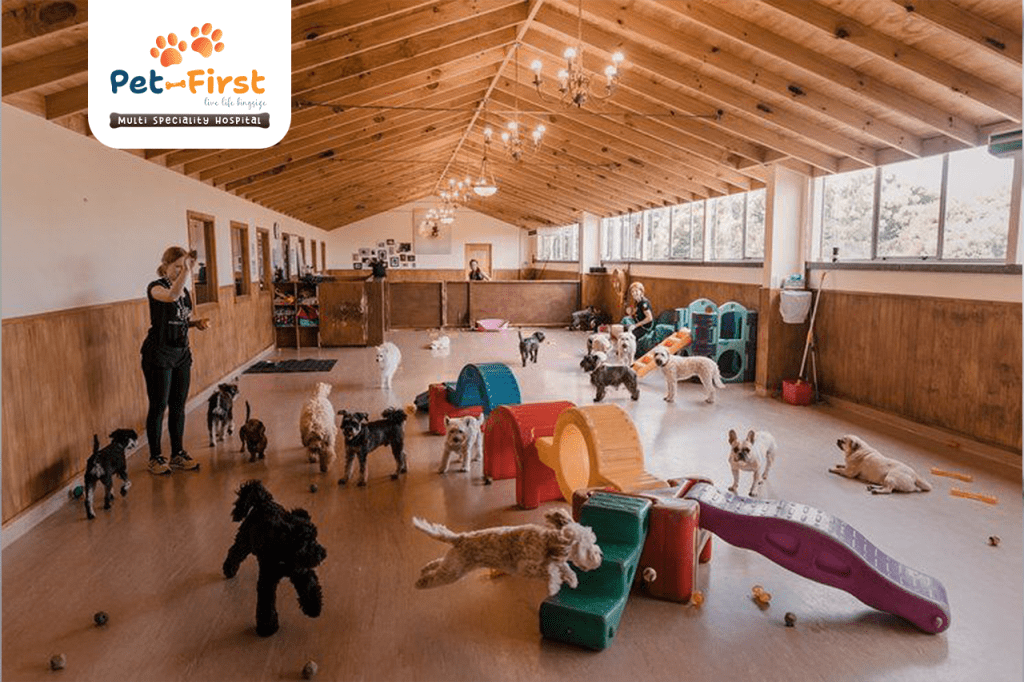
Pet Boarding Hyderabad: Why Pet First Is the Safest Choice Finding reliable pet boarding in Hyderabad can be stressful for pet parents. Whether you’re traveling for work, planning a vacation, or facing an emergency, leaving your furry companion behind is never an easy decision. You want more than just a place to stay — you want safety, medical supervision, comfort, and genuine care. That’s where Pet First, a 24/7 multispecialty pet hospital, redefines the concept of pet boarding Hyderabad by combining professional boarding services with round-the-clock veterinary care. In this blog, we’ll explore why Pet First is the preferred choice for responsible pet parents and what makes hospital-based pet boarding the safest option. Understanding Pet Boarding in Hyderabad Pet boarding refers to professional facilities that provide temporary accommodation and care for pets when owners are unavailable. These facilities typically offer: Secure stays for dogs and cats Feeding as per schedule Exercise and playtime Basic hygiene and cleaning However, not all pet boarding services are equal. Many conventional boarding centers lack medical infrastructure, trained veterinarians, or emergency preparedness — which can put pets at risk. Why Choose Hospital-Based Pet Boarding in Hyderabad? When your pet stays at a veterinary hospital-based boarding facility, the level of care goes far beyond standard kennels. Key Benefits of Hospital-Based Pet Boarding: Immediate access to veterinarians 24/7 medical monitoring Emergency care readiness Safe for senior pets and pets with health conditions Professional handling by trained staff At Pet First, pet boarding Hyderabad is designed with a medical-first approach, ensuring your pet’s health and safety at all times. Pet First: A Trusted Name in Pet Boarding Hyderabad Pet First is not just a boarding facility — it is a 24/7 multispecialty pet hospital in Hyderabad, trusted by thousands of pet parents. What Sets Pet First Apart? ✅ 24/7 veterinary availability ✅ Advanced medical infrastructure ✅ Experienced vets & trained caregivers ✅ Hygienic, stress-free boarding spaces ✅ Personalized care plans By integrating medical excellence with compassionate boarding services, Pet First has become a leading name for boarding pet Hyderabad. 24/7 Veterinary Supervision: Safety You Can Trust Medical emergencies can occur anytime — even in seemingly healthy pets. Most boarding facilities shut down at night or rely on external clinics during emergencies. At Pet First, your pet is never alone. Round-the-Clock Care Includes: Continuous health observation Emergency response at any hour On-site diagnostic facilities Immediate treatment if required This makes Pet First one of the safest options for boarding pet in Hyderabad, especially for pets with special needs. Ideal Pet Boarding in Hyderabad for Senior & Special-Needs Pets Senior pets, post-surgery pets, and pets with chronic conditions require extra attention. Pet First specializes in boarding for: Elderly dogs and cats Pets on medication Post-operative recovery pets Pets with anxiety or special diets Unlike regular kennels, Pet First’s pet boarding services ensure: Timely medication administration Vet-supervised recovery Stress management techniques Comfortable & Hygienic Boarding Environment A clean, calm environment is essential for your pet’s physical and emotional well-being. Facilities at Pet First Include: Clean, ventilated boarding spaces Separate areas for dogs and cats Regular sanitization protocols Comfortable bedding Calm, noise-controlled surroundings Personalized Care & Feeding Plans No two pets are the same — and Pet First understands that. Customized Care Includes: Diet as per owner instructions Prescription or special diets Feeding schedule maintenance Activity levels based on pet’s age and health Stress-Free Experience for Anxious Pets Many pets experience separation anxiety when away from home. Pet First follows fear-free handling techniques to reduce stress and anxiety. Stress Management Techniques: Gentle handling Familiar routines Minimal confinement Human interaction and reassurance This makes Pet First ideal for pets who struggle with regular boarding environments. Pet Boarding Hyderabad for Working Professionals & Travelers Hyderabad’s fast-paced lifestyle means many pet parents need reliable short-term and long-term boarding solutions. Pet First offers: Short-term pet boarding Long-term pet boarding Emergency boarding services Boarding during festivals & holidays With flexible plans, Pet First simplifies pet boarding for modern pet parents. Safety & Security You Can Rely On At Pet First: Pets are supervised by trained staff Secure entry and exit protocols Proper identification procedures No overcrowding Your pet’s safety is treated with the same priority as their health. Transparent Communication with Pet Parents Pet parents deserve peace of mind. Pet First ensures: Regular updates (on request) Clear communication Transparency in care and treatment Follow us on Instagram for more updates! Why Pet Parents Prefer Pet First for Pet Boarding Hyderabad Here’s why Pet First consistently ranks as a top choice: Hospital-grade care 24/7 emergency readiness Multispecialty veterinary support Clean and calm environment Compassionate, trained team Final Thoughts: Choose the Best Pet Boarding in Hyderabad Leaving your pet behind doesn’t have to be stressful. With Pet First, you’re choosing more than just pet boarding Hyderabad — you’re choosing medical safety, compassionate care, and complete peace of mind. Whether it’s a weekend trip or an extended stay, Pet First ensures your pet is cared for like family, under expert veterinary supervision, 24/7. Pet First — Where Care Comes First, Even When You’re Away. 🐾 Follow us on Instagram for more updates!
How Often to Groom Your Pet? Pet Grooming in Hyderabad Guide
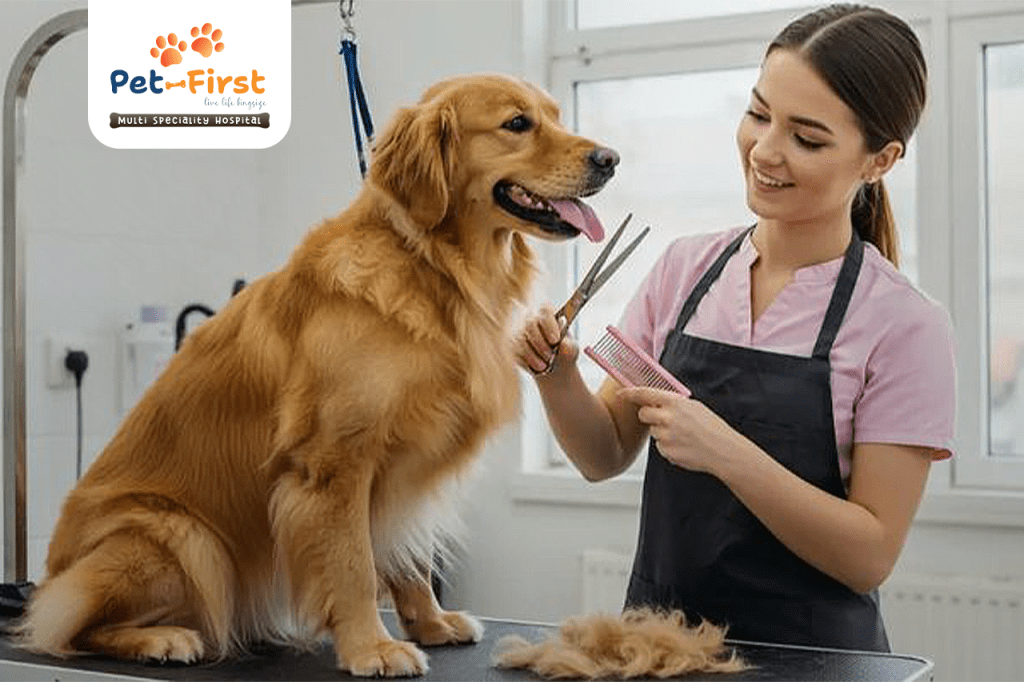
How Often Should You Groom Your Pet? Expert Tips from Pet Grooming in Hyderabad Pet Grooming in Hyderabad is more than a beauty routine—it’s a crucial part of your pet’s health, hygiene, and emotional well-being. Whether you’re a first-time pet parent or someone handling multiple furry companions, one question always comes up: How often should I groom my pet? The truth is, grooming frequency depends on several factors—your pet’s breed, coat type, size, climate, daily activity level, and even health conditions. As experts from Pet Grooming in Hyderabad, we’ve created a complete guide to help you understand exactly when and how often to groom your pets, along with practical tips that make grooming stress-free. Let’s dive in! Book an Appointment at Pet First Hospital Today! Why Grooming Matters More Than You Think Many pet parents assume grooming is mostly about making pets look neat. But professionals know grooming plays a huge role in: Preventing skin infections Reducing shedding and matting Maintaining coat health Controlling ticks & fleas Keeping nails healthy Improving oral hygiene Enhancing your pet’s comfort Early detection of lumps, bumps, or health issues Regular grooming improves both hygiene and longevity. And with Hyderabad’s warm climate and dust exposure, grooming becomes even more essential. How Often Should You Groom Your Pet? (Breed-Wise Breakdown) Different pets have different grooming needs. Here is a clear rulebook: 1. Short-Haired Dogs (Labradors, Pugs, Beagles, Indies) Grooming Frequency: Bath: Once every 3–4 weeks Brushing: 2–3 times a week Nail Trim: Every 3–4 weeks Ear Cleaning: Weekly Full Grooming Session: Once every 4–6 weeks Short coats may look low-maintenance, but they shed a lot. Regular brushing helps reduce hair fall and maintain a healthy coat. 2. Long-Haired Dogs (Shih Tzu, Lhasa Apso, Golden Retriever, Cocker Spaniel) Grooming Frequency: Bath: Every 2–3 weeks Brushing: Daily Nail Trim: Every 3 weeks Haircut: Every 4–6 weeks Full Grooming: Once every 3–4 weeks Long-coated dogs are prone to matting, tangles, dandruff, and skin infections — regular professional grooming is essential. 3. Cats (Short-haired and Long-haired) Grooming Frequency: Short-haired cats: Full grooming every 6–8 weeks Long-haired cats: Full grooming every 4–6 weeks Brushing: 2–3 times per week Bath: Only when needed Cats self-clean, but professional grooming helps with shedding, mat removal, and flea control—especially in Hyderabad’s humid seasons. 4. Puppies & Kittens (All Breeds) Start grooming from 8–12 weeks to build comfort. Frequency: Mini grooming every 2 weeks Full grooming every 4 weeks Puppies adjust faster when grooming becomes part of their early routine. 5. Double-Coated Dogs (Siberian Husky, German Shepherd, Spitz) Grooming Frequency: Bath: Every 4–6 weeks Brushing: 3–4 times a week Deshedding Treatment: Every 6–8 weeks Full Grooming: Monthly In Hyderabad’s heat, double-coated breeds need consistent grooming to prevent overheating and excessive shedding. How Hyderabad’s Climate Affects Grooming Needs Hyderabad experiences warm temperatures, humidity, and dust—leading to: Faster coat greasiness More shedding Skin irritations Parasite issues in monsoon Dehydration and flaky skin in summer This makes regular professional Pet Grooming in Hyderabad vital for maintaining coat and skin health. Follow Us on Instagram for Daily Pet Care Advice! Signs Your Pet Needs Immediate Grooming Even if you follow a schedule, watch for these signs: ✔ Strong odor ✔ Excessive hair fall ✔ Tangles or mats ✔ Redness or itching ✔ Dirty or smelly ears ✔ Tear stains ✔ Long nails clicking on the floor ✔ Dandruff patches If you notice any of the above, book a grooming session immediately. Book an Appointment at Pet First Hospital Today! Inside a Full Grooming Session: What Happens? A professional grooming package usually includes: Bath with premium pet shampoos Blow drying Brushing & detangling Haircut / styling Nail trimming Paw pad cleaning Ear cleaning Sanitary trimming Tick & flea treatment (if needed) Coat conditioning A complete session ensures your pet looks clean, stays healthy, and feels pampered. Professional vs. At-Home Grooming: What’s Best? At-Home Pet Grooming in Hyderabad Helps With: Routine brushing Basic hygiene Weekly maintenance Bonding time Professional Pet Grooming in Hyderabad Helps With: Coat trimming & shaping Advanced brushing & de-shedding Safe nail trimming Ear care & infection prevention Sanitary trimming Tick & flea control Handling sensitive or anxious pets For perfect results + safety → a combination of both works best. How to Choose the Best Pet Grooming in Hyderabad While selecting a grooming center, check for: ✔ Certified professional groomers ✔ Clean & hygienic setup ✔ Pet-friendly products only ✔ Stress-free grooming environment ✔ Transparent pricing ✔ Good reviews and ratings ✔ Experience with all breeds ✔ Safety measures & trained staff A good grooming center keeps pets comfortable and owners worry-free. Grooming Mistakes Pet Parents Should Avoid Bathing too often (can cause dry skin)Skipping brushing sessions Cutting nails too short Using human shampoos on pets Ignoring ear cleaning Not checking for fleas & ticks Regular professional grooming helps prevent these mistakes. Follow Us on Instagram for Daily Pet Care Advice! Recommended Grooming Schedule Summary Pet Type Grooming Frequency Short-Haired Dogs Every 4–6 weeks Long-Haired Dogs Every 3–4 weeks Cats Every 4–8 weeks Double-Coated Dogs Every 4–6 weeks Puppies/Kittens Every 2–4 weeks Pet Grooming in Hyderabad – Expert Tips Here are insider tips from professional Pet Grooming in Hyderabad stylists: Use detangling sprays for long-haired breeds Always moisturize paw pads in winter Do de-shedding before summer begins Use anti-tick shampoos monthly during monsoon Brush daily for curly breeds like poodles Keep hair short during extreme summers These small steps make a big difference. Book an Appointment at Pet First Hospital Today! Conclusion: Grooming Is a Necessity, Not a Luxury Regular grooming keeps your pet healthier, happier, and more comfortable. With Hyderabad’s climate, dust, and humidity, it’s even more important to follow a consistent grooming schedule. Whether you own a cat, a puppy, or a long-haired breed—professional Pet Grooming in Hyderabad ensures your pet receives the right care, at the right time, from trained hands. Your pet deserves the best—and grooming is one of the easiest ways to keep them looking great, feeling fresh,
Common Pet Emergencies That Need Instant Action
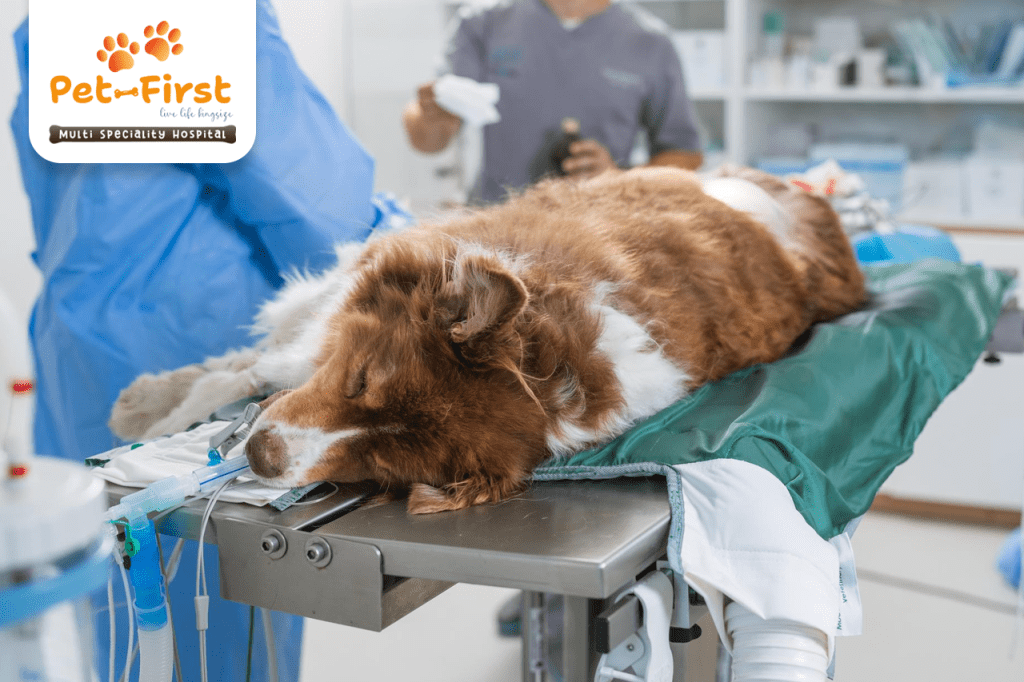
Pet emergencies never come with a warning. One moment your pet is playing happily, and the next they may be in pain, distress, or even fighting for their life. Knowing how to recognize common pet emergencies and taking instant action can make the difference between life and death. Whether you’re searching for a 24/7 emergency vet near me, facing a late-night crisis, or simply preparing as a responsible pet parent, this guide will help you understand what qualifies as a pet emergency, what immediate steps to take, and when to rush to an emergency veterinary hospital. Why Pet Emergencies Require Immediate Action Animals instinctively hide pain, which means symptoms often appear only when a condition becomes serious. Delaying treatment—even by a few hours—can lead to: Organ failure Permanent injury Severe infection Fatal complications That’s why access to a 24/7 emergency vet clinic near you is essential. Emergency veterinary care is designed to handle critical cases, provide rapid diagnosis, and stabilize pets when every second counts. Most Common Pet Emergencies That Need Instant Veterinary Care 1. Breathing Difficulties (Respiratory Distress) If your pet is struggling to breathe, this is a true medical emergency. 🚨 Warning Signs: Rapid or labored breathing Open-mouth breathing (especially in cats) Blue or pale gums Wheezing, choking, or gasping ⚡ Immediate Action: Keep your pet calm and avoid exertion Do not attempt home remedies Rush to the nearest 24/7 emergency vet near me Breathing issues may be caused by heart failure, pneumonia, airway obstruction, allergic reactions, or trauma. 2. Severe Bleeding or Trauma (Accidents & Injuries) Road accidents, falls, dog fights, or sharp object injuries can cause life-threatening bleeding. 🚨 Warning Signs: Heavy bleeding Visible wounds or fractures Limping or inability to stand Whining, shock, or collapse ⚡ Immediate Action: Apply gentle pressure using a clean cloth Keep your pet warm and still Visit an emergency vet clinic immediately Internal bleeding may not be visible but can be fatal without prompt treatment. 3. Poisoning or Toxin Ingestion Pets are naturally curious and may ingest toxic substances without you realizing it. ☠️ Common Pet Poisons: Chocolate, grapes, onions Rat poison, insecticides Human medications Cleaning chemicals Toxic plants 🚨 Warning Signs: Vomiting or diarrhea Excessive drooling Seizures or tremors Sudden collapse ⚡ Immediate Action: Do not induce vomiting unless advised by a vet Bring the toxin container if possible Rush to a 24/7 emergency vet near you Time is critical in poisoning cases—early treatment can save your pet’s life. 4. Seizures or Sudden Collapse A seizure is one of the most alarming emergencies for pet parents. 🚨 Warning Signs: Uncontrolled shaking Loss of consciousness Disorientation after an episode Repeated seizures within hours ⚡ Immediate Action: Keep your pet away from sharp objects Do not put hands near the mouth Seek immediate care from an emergency veterinary hospital Seizures may indicate epilepsy, poisoning, brain injury, or metabolic disorders. 5. Persistent Vomiting or Severe Diarrhea Occasional vomiting is common, but repeated episodes are not. 🚨 When It Becomes an Emergency: Vomiting more than 2–3 times Blood in vomit or stool Signs of dehydration Lethargy or abdominal pain ⚡ Immediate Action: Withhold food temporarily Provide small amounts of water Visit a 24/7 emergency vet clinic near me This could signal pancreatitis, intestinal blockage, infections, or internal bleeding. 6. Difficulty Urinating or Complete Blockage Urinary blockages—especially in male cats—are extremely dangerous. 🚨 Warning Signs: Straining to urinate Crying in the litter box Frequent attempts with no output Blood in urine ⚡ Immediate Action: Do not wait Transport your pet to an emergency vet immediately A blocked bladder can rupture within hours and be fatal. 7. Heatstroke In warm climates, heatstroke is a common yet preventable pet emergency. 🚨 Warning Signs: Excessive panting Drooling Vomiting Collapse or seizures ⚡ Immediate Action: Move pet to a cool area Offer small sips of water Seek emergency care at a 24/7 vet hospital Heatstroke can cause organ failure if untreated. 8. Sudden Abdominal Swelling (Bloat/GDV) This condition, common in large dog breeds, is rapidly fatal without surgery. 🚨 Warning Signs: Swollen, hard abdomen Unproductive retching Restlessness and pain ⚡ Immediate Action: Do not wait Rush to the nearest emergency vet near me 9. Eye Injuries or Sudden Vision Loss Eye emergencies progress quickly and can cause permanent blindness. 🚨 Warning Signs: Squinting or pawing at the eye Redness or discharge Cloudy or bulging eye ⚡ Immediate Action: Prevent rubbing Seek immediate veterinary care 10. Labor Complications (Dystocia) Birthing difficulties require urgent veterinary attention. 🚨 Warning Signs: Strong contractions without delivery Prolonged labor Weakness or bleeding ⚡ Immediate Action: Visit a 24/7 emergency vet clinic immediately Why You Need a 24/7 Emergency Vet Near You Pet emergencies don’t follow clinic hours. A 24/7 emergency veterinary hospital offers: Round-the-clock medical care On-site diagnostics (X-ray, ultrasound, lab tests) ICU and oxygen support Trained emergency veterinarians Searching “emergency vet near me open now” ahead of time ensures you’re prepared when it matters most. How to Prepare for a Pet Emergency ✔ Save your nearest emergency vet’s number ✔ Keep a pet first-aid kit at home ✔ Know your pet’s normal behavior ✔ Never ignore sudden changes Preparation reduces panic and speeds up treatment. Frequently Asked Questions (FAQs) What is the most common pet emergency? The most common pet emergencies include breathing difficulties, poisoning, trauma from accidents, severe vomiting/diarrhea, and urinary blockages. These conditions require immediate evaluation by a 24/7 emergency vet near you. What is the immediate action of an emergency? The immediate action during a pet emergency is to stay calm, prevent further harm, and seek professional veterinary care immediately. Avoid home treatments unless directed by a vet and transport your pet to the nearest emergency veterinary hospital. What are 5 examples of emergency situations? Five common pet emergency situations include: Difficulty breathing Severe bleeding or trauma Poison ingestion Seizures Urinary blockage All require urgent veterinary attention. What are the 3 C’s of emergency response? The 3 C’s of emergency response are: Check – Assess your pet’s condition Call
Why Pets Keep Scratching: Hidden Allergies | PF
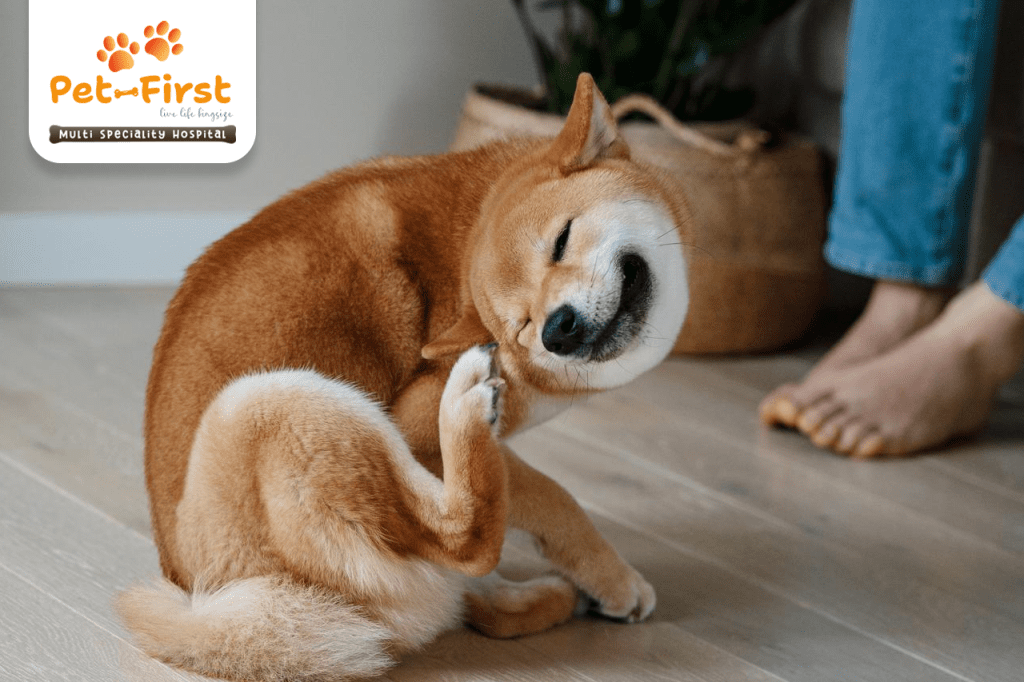
Ever noticed your pet pause mid-play just to scratch uncontrollably, chew their paws, or rub themselves against the carpet like their life depends on it? At first, you might laugh it off — “It’s just a small itch.” But when scratching becomes a daily routine, it’s no longer funny. Your furry friend may be suffering from pet scratching allergies , one of the most common and overlooked reasons behind persistent itching, redness, and hair loss. As pet parents, it’s heartbreaking to watch our dogs or cats struggle. That nonstop scratching is often their way of saying, “I’m not okay.” Understanding the hidden reasons behind the itch is the first step toward helping your pet live a comfortable, allergy-free life. This detailed guide explains why your pet keeps scratching, the hidden allergies behind it, and what you can do to protect their health. 1. Environmental Allergies – Invisible Irritants Triggering Constant Itching One of the leading causes of itching in dogs and cats is environmental allergies. Just like humans can react to pollen, dust, or mold, pets too develop pet scratching allergies and cat skin allergies when exposed to tiny airborne particles. These allergens settle on your pet’s skin and penetrate the surface, causing irritation that leads to excessive scratching. Common Environmental Triggers Dust mites Pollen from grass, weeds, or flowers Mold spores Cleaning sprays and strong fragrances Smoke or chemical residue Pets who enjoy rolling in the grass or sitting near open windows are more exposed to outdoor allergens. When these particles attach to their coat, symptoms often follow. Signs Your Pet Has Environmental Allergies – (pet scratching allergies) Redness around paws or belly Watery eyes Licking or chewing paws Sneezing Dry, flaky skin Itchy ears These symptoms can fluctuate with seasons, making this the most underestimated form of pet scratching allergies How to Help Clean your pet’s bedding weekly Use a HEPA air purifier Choose hypoallergenic pet shampoos Avoid strong chemical cleaners Keep windows closed during high-pollen days Regular grooming with a pH-balanced pet shampoo can help reduce environmental allergens in pets, preventing flare-ups. 2. Fleas and Parasites – The Itch You Can’t Always See If your dog is constantly scratching near their tail, or your cat can’t stop licking their hind legs, fleas may be the hidden enemy. Even one flea bite can trigger flea allergy dermatitis (FAD) — a painful allergic reaction that leads to severe itching. How Fleas Affect Sensitive Pets Flea saliva contains allergens that cause inflammation. Sensitive pets develop: Red bumps along the back or tail Scabs and open sores Sudden hair loss Intense biting or scratching Because fleas multiply fast, a tiny infestation can quickly turn into a full-blown allergy problem. How to Check for Fleas Look for tiny black specks (flea dirt) Inspect fur around the tail base Look for small red bumps or irritation Observe if your pet is restless or biting constantly Solution Use vet-approved flea collars Apply spot-on flea treatments Wash pet toys and blankets in hot water Vacuum carpets and sofas weekly Fleas are among the most common hidden causes of pet skin irritation, yet many pet parents don’t realize they’re present until symptoms become severe. 3. Food Allergies – When Mealtime Becomes a Trigger Did you know that food allergies in pets often appear as skin problems rather than stomach issues? Many pets react to protein sources in their diet, such as: Chicken Beef Dairy Eggs Wheat Soy When your pet consumes allergens, their immune system releases histamines that cause inflammation, leading to itchy skin, ear infections, or digestive issues. Common Signs of Food Allergies Itchy ears Chronic ear infections Hot spots Red, inflamed skin Vomiting or diarrhea (sometimes) Licking paws after meals How to Identify Food Allergies The best method is an elimination diet, where you: Switch to a single-protein food (like duck or salmon). Feed it for 8–12 weeks. Slowly reintroduce ingredients to find the allergen. Choosing hypoallergenic pet food can help reduce flare-ups and support skin healing. Extra Tip Replace plastic food bowls with stainless steel or ceramic to avoid bacterial buildup that irritates sensitive skin. 4. Grooming Mistakes – The Overlooked Root Cause Poor grooming habits can cause or worsen pet skin allergies. Many pet parents unknowingly use harsh shampoos or forget to clean essential items, leading to recurring flare-ups. Common Grooming Mistakes Using human shampoo Not brushing the coat regularly Not washing pet bedding Using harsh detergents Allowing dirt buildup on collars and harnesses Human shampoos disrupt the pet’s natural pH balance, causing dryness, flakiness, and itching. Unwashed accessories accumulate dust mites, dirt, pollen, and bacteria — all major allergy triggers. How to Fix This Use gentle, pet-safe grooming products Wash collars, bedding, and brushes weekly Choose antibacterial wipes for quick clean-ups Brush your pet daily to remove trapped allergens Grooming isn’t just about appearance — it’s a crucial part of preventing pet skin allergies. 5. Underlying Health Conditions – When the Itch Is a Warning Sign Sometimes, scratching is a symptom of a deeper issue. Conditions like: Hypothyroidism Cushing’s disease Hormonal imbalance Bacterial skin infection Fungal infection …can all cause chronic itching in pets. Warning Signs It May Be a Medical Problem Itching doesn’t improve with treatment Thick or crusty patches on the skin Recurrent ear infections Strong odor from skin or ears Noticeable hair loss Weight changes or unusual behavior If these symptoms appear, it’s time to visit your vet to rule out deeper causes. Prevention: How to Stop Pet Skin Allergies Before They Start Preventing pet skin allergies is far easier than treating them later. Here’s how you can protect your pet: Regular Grooming Use anti-allergy shampoos, soft bristle brushes, and medicated grooming products when necessary. Keep Your Home Clean Vacuum carpets regularly and use an air purifier to remove indoor allergens. Wash Pet Bedding Weekly Use fragrance-free detergent to avoid triggering dog skin allergies or cat skin allergies. Give a Balanced Diet A diet rich in omega-3 and omega-6 fatty acids improves skin health and strengthens the
Why Pets Get Sick More in Winter: Complete Guide
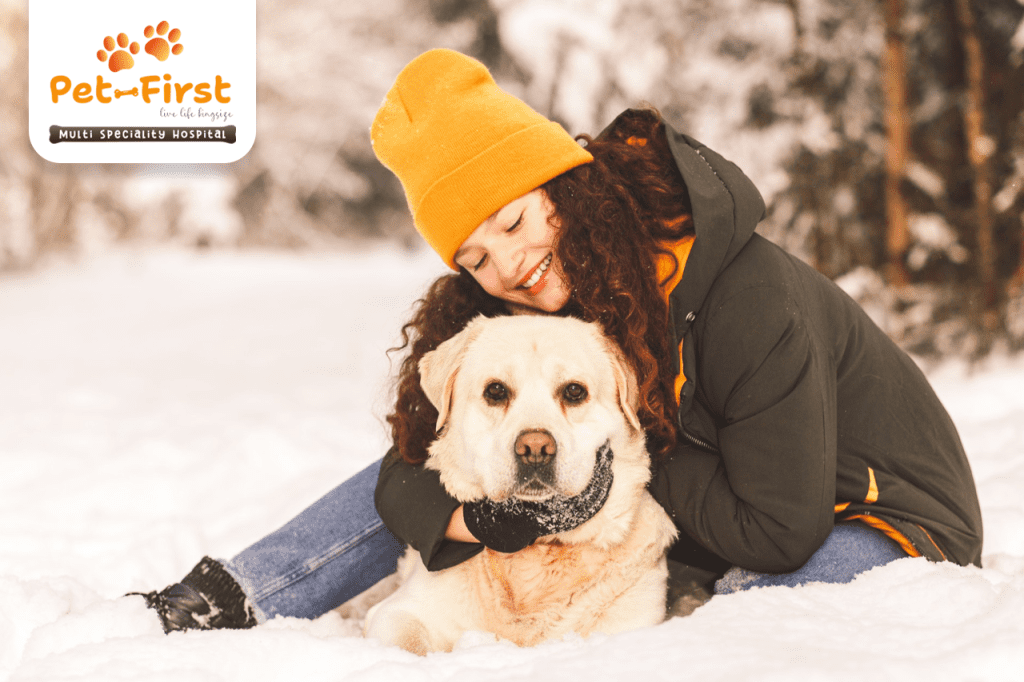
Winter brings cozy blankets, warm drinks, and lazy mornings for humans—but for pets, the season often brings discomfort, health issues, and sudden changes in behavior. Many pet parents wonder Why Pets Get Sick More in Winter, especially when their furry companions begin showing signs of dryness, reduced acti In this comprehensive guide, we explore the science behind winter-related illnesses in pets, common symptoms to watch for, and veterinary-approved strategies to ensure your pet stays warm, healthy, and happy. Whether you have a dog, cat, or senior pet, knowing Why Pets Get Sick More in Winter can help you prevent seasonal problems before they escalate. 1. How Winter Affects Pets’ Health Many pet parents are unaware that the winter season impacts animals far more than humans realize. Pets have different temperature tolerance levels, and cold weather can cause various internal and external changes. Lower Immunity During Cold Months One major reason Why Pets Get Sick More in Winter is the seasonal decline in immunity. Just like humans experience colds and infections when temperatures drop, pets also become more vulnerable to viruses, bacteria, and fungal infections during chilly months. Cold air can: Dry out nasal passages Reduce natural moisture barriers Encourage the spread of contagious illnesses Increase stress levels in pets These factors collectively weaken the immune system. Cold Temperatures Impact Body Regulation Pets regulate their body temperature through fur and metabolism. During winter, this process becomes harder, especially for short-haired breeds, small dogs, senior pets, and young puppies. When pets struggle to maintain their internal heat, they burn more calories, lose energy faster, and become more prone to illness. 2. Common Winter Illnesses in Pets Understanding Why Pets Get Sick More in Winter starts with knowing the major health problems pets face during cold weather. Respiratory Infections Dry, cold air affects the respiratory system, leading to: Coughing Sneezing Nasal discharge Breathing difficulties Kennel cough, canine flu, and feline respiratory infections increase significantly during winter. Dry Skin & Dandruff Low humidity causes: Itchy skin Flaky coat Dandruff Excessive shedding This is especially common in dogs who spend time near heaters or air blowers. Joint Pain & Stiffness Senior pets and breeds prone to arthritis experience worsening symptoms due to decreased joint lubrication in cold weather. This is one of the strongest reasons Why Pets Get Sick More in Winter, as joint-related discomfort often goes unnoticed until it becomes severe. Digestive Issues Winter reduces physical activity. Combined with overeating or poor hydration, pets may experience: Constipation Low appetite Digestive discomfort Hypothermia & Frostbite Pets exposed to extremely low temperatures may experience: Shivering Weakness Pale ears or paws Blue-tinted skin (severe cases) Outdoor pets and small breeds are at highest risk. 3. Why Pets Behave Differently in Winter Another aspect of Why Pets Get Sick More in Winter relates to their behavior and mood. Reduced Activity Levels Shorter days and cold temperatures reduce outdoor playtime, leading to: Weight gain Boredom Restlessness Slow metabolism Seasonal Depression (Yes, It Happens!) Pets may experience seasonal affective disorder-like symptoms due to: Reduced sunlight Limited movement Lonely indoor hours This can lower immunity and increase the risk of illness. 4. Breeds Most Affected During Winter Not all pets tolerate cold weather the same way. Some breeds naturally struggle more in low temperatures, explaining Why Pets Get Sick More in Winter. High-Risk Breeds Beagles Pugs Dachshunds Chihuahuas Greyhounds Short-haired cats (like Siamese) Breeds More Comfortable in Winter Huskies Saint Bernards German Shepherds Tibetan Mastiffs However, even cold-resistant breeds need proper winter care. 5. Indoor Environment Plays a Bigger Role Than You Think One surprising reason Why Pets Get Sick More in Winter is the environment inside your home. Heaters Dry Out Skin Constant exposure to heating systems leads to: Dehydration Itchiness Rough skin texture Cold Floors Cause Joint Pain Tiles, marble flooring, and cold surfaces worsen stiffness in pets. Poor Ventilation Spreads Germs Closed rooms trap: Germs Allergens Dust This increases respiratory issues. Providing warm resting areas and using humidifiers can significantly improve your pet’s winter comfort. 6. Early Signs Your Pet Isn’t Handling Winter Well Knowing Why Pets Get Sick More in Winter also means recognizing symptoms early. Warning Signs Continuous shivering Avoiding cold floors Red or cracked paws Dry, flaky skin Lethargy Reduced appetite Slow movement Excessive licking of joints Irritability or mood swings If these signs persist, consult a veterinarian immediately. 7. When to Visit a Vet: Your Winter Health Checklist Because winter illnesses escalate quickly, timely medical care is important. Facilities like pets first hospital 24/7, pet’s care super specialty hospital jubilee hills, and pets first hospital offer round-the-clock care for sudden winter emergencies. Visit a vet if your pet shows: Persistent coughing or nasal discharge Sudden limping or stiffness Continuous shivering Lack of appetite for more than 24 hours Difficulty breathing Visible skin irritation Early intervention prevents complications like pneumonia, arthritis flare-ups, or severe dehydration. 8. How to Protect Pets From Winter Illnesses Now that you understand Why Pets Get Sick More in Winter, here are proven strategies to prevent seasonal issues. Warm, Insulated Bedding Use: Thick blankets Foam beds Heated pads (with safety precautions) Elevated beds (away from cold floors) Smart Layering Short-haired pets benefit from: Sweaters Jackets Booties for paw protection Hydration & Diet Adjustments Keep water at room temperature Add wet food to meals Warm broth with kibble Consult a vet for calorie adjustments Regular Grooming Brush frequently to distribute natural oils Avoid shaving fur short Limit baths to prevent dryness Indoor Enrichment Since outdoor time reduces in winter: Puzzle feeders Interactive toys Indoor sniffing games Short indoor workout sessions Paw & Nose Protection Use: Pet-safe paw balms Moisturizing nose balms Wipe paws after walks 9. Winter Care for Senior Pets Senior pets are among the most affected, which is a major contributor to Why Pets Get Sick More in Winter. Extra Care Tips: Orthopedic bedding Warm clothing Joint supplements (vet-approved) Low-impact exercises Avoid cold floors Routine health checkups Hospitals like pets first hospital 24/7 and pet’s care super specialty hospital
